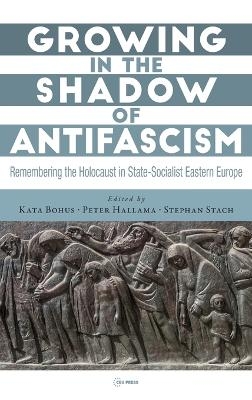
Growing in the Shadow of Antifascism
Central European University Press (Verlag)
978-963-386-435-7 (ISBN)
The authors provide various interpretations of the relationship between antifascism and Holocaust memory in the communist countries, arguing that the predominance of an antifascist agenda and the acknowledgment of the Jewish catastrophe were far from mutually exclusive. The interactions included acts of negotiation, cross-referencing, and borrowing. Detailed case studies describe how both individuals and institutions were able to use anti-fascism as a framework to test and widen the boundaries for discussion of the Nazi genocide. The studies build on the new historiography of communism, focusing on everyday life and individual agency, revealing the formation of a great variety of concrete, local memory practices.
Dr. Kata Bohus is senior research advisor at the University of Tromsø Dr. Peter Hallama is research fellow at the University of Bern, Switzerland. Stephan Stach is a historian at Leibniz Institute for the History and Culture of Eastern Europe, Leipzig.
Figures
Acronyms and Abbreviations
Acknowledgements
Introduction
Kata Bohus, Peter Hallama, Stephan Stach
PART I. Historiography
Edition of Documents from the Ringelblum Archive (the Underground Archive of the Warsaw Ghetto) in Stalinist Poland
Katarzyna Person, Agnieszka Żółkiewska
“A Great Civic and Scientific Duty of Our Historiography.” Czech Historians and the Holocaust in the 1970s and 1980s
Peter Hallama
The Conflicted Identities of Helmut Eschwege: Communist, Jew and Historian of the Holocaust in the German Democratic Republic
Benjamin Lapp
PART II. Sites of Memory
Parallel Memories? Public Memorialization of the Antifascist Struggle and Martyr Memorial Services in the Hungarian Jewish Community during Early Communism
Kata Bohus
Holocaust Narrative(s) in Soviet Holocaust Narrative(s) in Soviet Lithuania: The Case of the Ninth Fort Museum in Kaunas
Gintarė Malinauskaitė
Memory Incarnate: Jewish Sites in Communist Poland and the Perception of the Shoah
Yechiel Weizman
PART III. Artistic Representations
Toward a Soviet Holocaust Novel: Traumatic Memory and Socialist Realist Aesthetics in Anatolii Rybakov’s Heavy Sand
Anja Tippner
Commissioned Memory. Official Representations of the Holocaust in Hungarian Art (1955–1965)
Daniel Véri
Towards a Shared Memory? The Hungarian Holocaust in Mass-Market Socialist Literature, 1956-1970
Richard S. Esbenshade
PART IV. Media and Public Debate
Distrusting the Parks: Heinz Knobloch’s Journalism and the Memory of the Shoah in the GDR
Alexander Walther
‘We Pledge, as if It was the Highest Sanctum, to Preserve the Memory.’ Sovetish Heymland, Facets of Holocaust Commemoration in the Soviet Union and the Cold War
Miriam Schulz
“The Jewish Diaries […] Undergo One Edition after the Other.” Early Polish Holocaust Documentation, East German Anti-Fascism and the Emergence of Holocaust Memory in Socialism
Stephan Stach
Conclusion
Making Sense of the Holocaust in Socialist Eastern Europe
Audrey Kichelewski
Contributors
| Erscheinungsdatum | 25.08.2021 |
|---|---|
| Zusatzinfo | 42 Illustrations, black and white |
| Verlagsort | Budapest |
| Sprache | englisch |
| Maße | 152 x 229 mm |
| Gewicht | 680 g |
| Themenwelt | Geschichte ► Allgemeine Geschichte ► 1918 bis 1945 |
| Geschichte ► Allgemeine Geschichte ► Zeitgeschichte | |
| Geisteswissenschaften ► Geschichte ► Regional- / Ländergeschichte | |
| Sozialwissenschaften ► Soziologie ► Spezielle Soziologien | |
| ISBN-10 | 963-386-435-6 / 9633864356 |
| ISBN-13 | 978-963-386-435-7 / 9789633864357 |
| Zustand | Neuware |
| Haben Sie eine Frage zum Produkt? |
aus dem Bereich


